An Analysis of Falsifiability in Psychological Theories
VerifiedAdded on 2020/06/04
|5
|1598
|83
Essay
AI Summary
This essay delves into the realm of psychological theories, specifically addressing the concept of falsifiability within the context of understanding human behavior. The essay provides a comprehensive discussion on the reliability and validity of several key psychological theories, including Freud's theory, cognitive theory, and behavioral theory. It argues that while falsifiability, the ability to be proven false, is a cornerstone of scientific inquiry, many psychological theories, though not always directly falsifiable in a strict scientific sense, are supported by empirical evidence and have proven invaluable in understanding the complexities of the human mind and behavior. The essay examines the core tenets of each theory, highlighting their contributions to the field and their practical applications in clinical settings and everyday life. Ultimately, the essay concludes that these theories, despite challenges in falsification, continue to provide valuable frameworks for understanding the human experience.
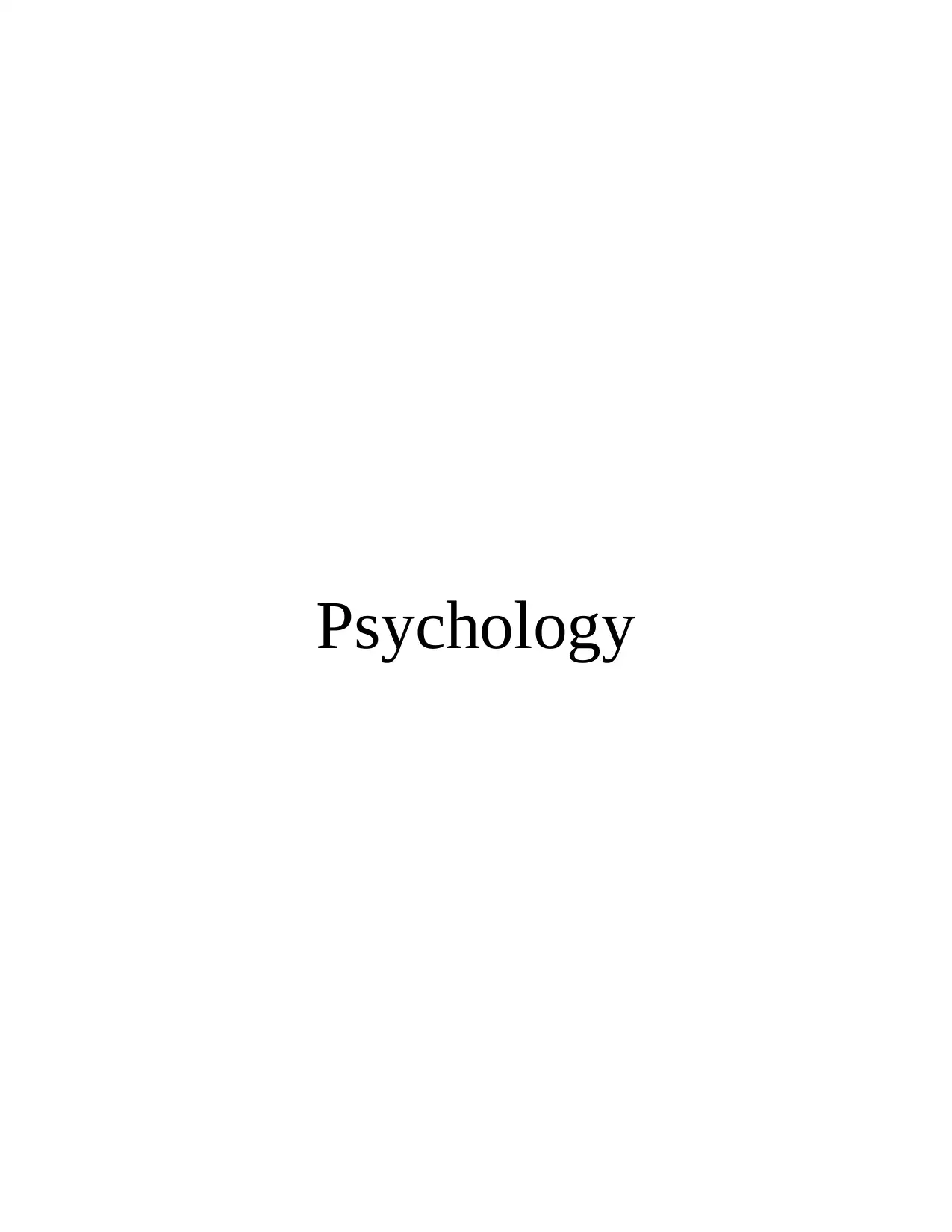
Psychology
Paraphrase This Document
Need a fresh take? Get an instant paraphrase of this document with our AI Paraphraser
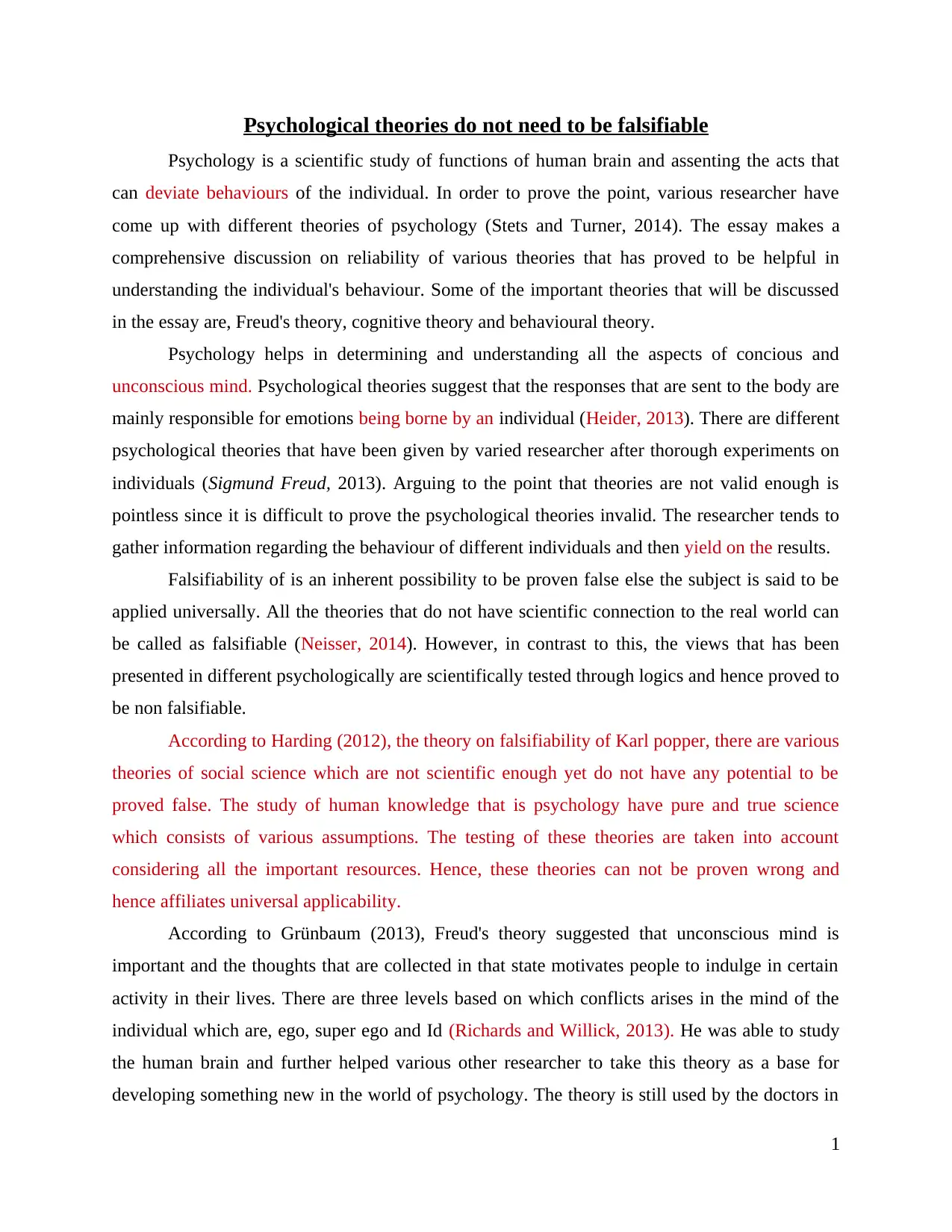
Psychological theories do not need to be falsifiable
Psychology is a scientific study of functions of human brain and assenting the acts that
can deviate behaviours of the individual. In order to prove the point, various researcher have
come up with different theories of psychology (Stets and Turner, 2014). The essay makes a
comprehensive discussion on reliability of various theories that has proved to be helpful in
understanding the individual's behaviour. Some of the important theories that will be discussed
in the essay are, Freud's theory, cognitive theory and behavioural theory.
Psychology helps in determining and understanding all the aspects of concious and
unconscious mind. Psychological theories suggest that the responses that are sent to the body are
mainly responsible for emotions being borne by an individual (Heider, 2013). There are different
psychological theories that have been given by varied researcher after thorough experiments on
individuals (Sigmund Freud, 2013). Arguing to the point that theories are not valid enough is
pointless since it is difficult to prove the psychological theories invalid. The researcher tends to
gather information regarding the behaviour of different individuals and then yield on the results.
Falsifiability of is an inherent possibility to be proven false else the subject is said to be
applied universally. All the theories that do not have scientific connection to the real world can
be called as falsifiable (Neisser, 2014). However, in contrast to this, the views that has been
presented in different psychologically are scientifically tested through logics and hence proved to
be non falsifiable.
According to Harding (2012), the theory on falsifiability of Karl popper, there are various
theories of social science which are not scientific enough yet do not have any potential to be
proved false. The study of human knowledge that is psychology have pure and true science
which consists of various assumptions. The testing of these theories are taken into account
considering all the important resources. Hence, these theories can not be proven wrong and
hence affiliates universal applicability.
According to Grünbaum (2013), Freud's theory suggested that unconscious mind is
important and the thoughts that are collected in that state motivates people to indulge in certain
activity in their lives. There are three levels based on which conflicts arises in the mind of the
individual which are, ego, super ego and Id (Richards and Willick, 2013). He was able to study
the human brain and further helped various other researcher to take this theory as a base for
developing something new in the world of psychology. The theory is still used by the doctors in
1
Psychology is a scientific study of functions of human brain and assenting the acts that
can deviate behaviours of the individual. In order to prove the point, various researcher have
come up with different theories of psychology (Stets and Turner, 2014). The essay makes a
comprehensive discussion on reliability of various theories that has proved to be helpful in
understanding the individual's behaviour. Some of the important theories that will be discussed
in the essay are, Freud's theory, cognitive theory and behavioural theory.
Psychology helps in determining and understanding all the aspects of concious and
unconscious mind. Psychological theories suggest that the responses that are sent to the body are
mainly responsible for emotions being borne by an individual (Heider, 2013). There are different
psychological theories that have been given by varied researcher after thorough experiments on
individuals (Sigmund Freud, 2013). Arguing to the point that theories are not valid enough is
pointless since it is difficult to prove the psychological theories invalid. The researcher tends to
gather information regarding the behaviour of different individuals and then yield on the results.
Falsifiability of is an inherent possibility to be proven false else the subject is said to be
applied universally. All the theories that do not have scientific connection to the real world can
be called as falsifiable (Neisser, 2014). However, in contrast to this, the views that has been
presented in different psychologically are scientifically tested through logics and hence proved to
be non falsifiable.
According to Harding (2012), the theory on falsifiability of Karl popper, there are various
theories of social science which are not scientific enough yet do not have any potential to be
proved false. The study of human knowledge that is psychology have pure and true science
which consists of various assumptions. The testing of these theories are taken into account
considering all the important resources. Hence, these theories can not be proven wrong and
hence affiliates universal applicability.
According to Grünbaum (2013), Freud's theory suggested that unconscious mind is
important and the thoughts that are collected in that state motivates people to indulge in certain
activity in their lives. There are three levels based on which conflicts arises in the mind of the
individual which are, ego, super ego and Id (Richards and Willick, 2013). He was able to study
the human brain and further helped various other researcher to take this theory as a base for
developing something new in the world of psychology. The theory is still used by the doctors in
1
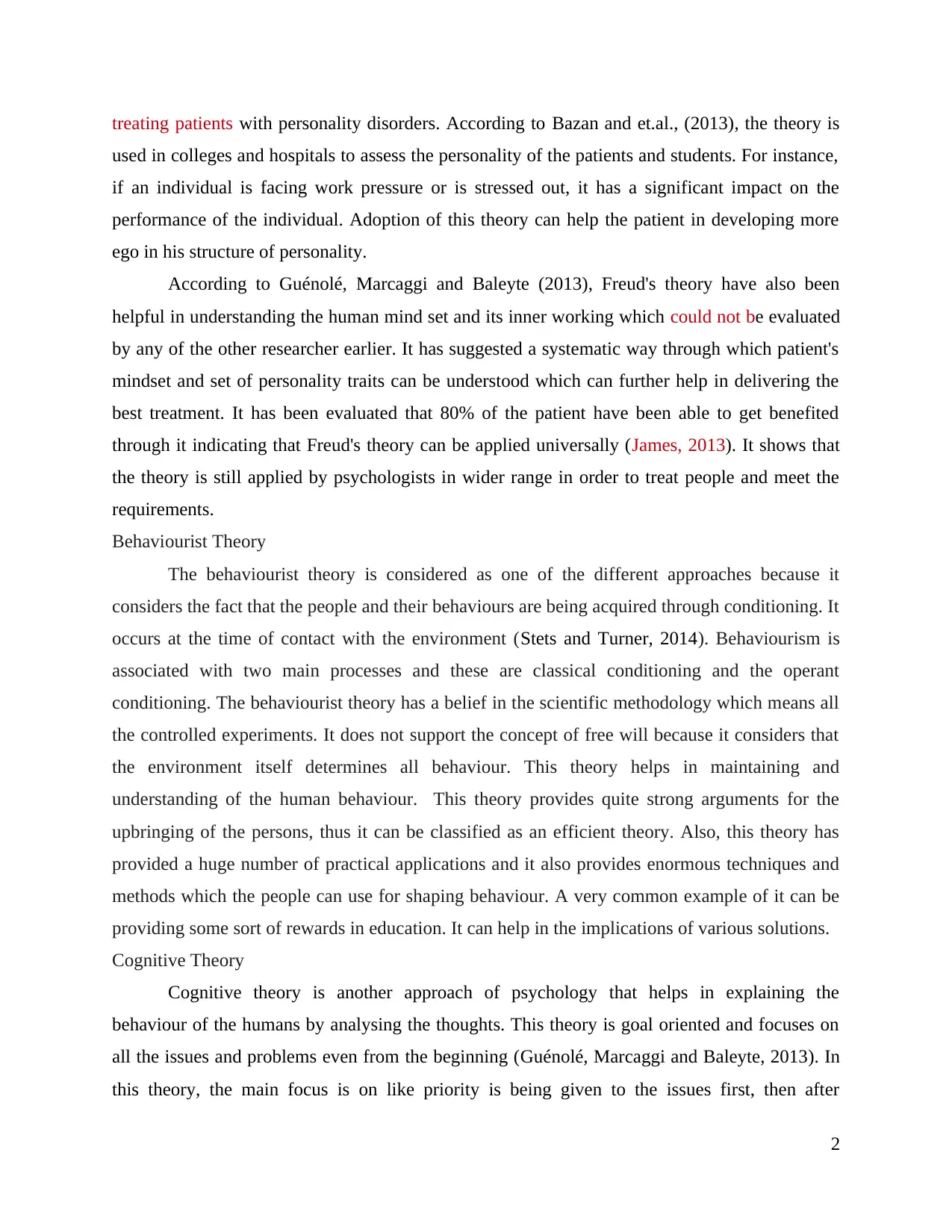
treating patients with personality disorders. According to Bazan and et.al., (2013), the theory is
used in colleges and hospitals to assess the personality of the patients and students. For instance,
if an individual is facing work pressure or is stressed out, it has a significant impact on the
performance of the individual. Adoption of this theory can help the patient in developing more
ego in his structure of personality.
According to Guénolé, Marcaggi and Baleyte (2013), Freud's theory have also been
helpful in understanding the human mind set and its inner working which could not be evaluated
by any of the other researcher earlier. It has suggested a systematic way through which patient's
mindset and set of personality traits can be understood which can further help in delivering the
best treatment. It has been evaluated that 80% of the patient have been able to get benefited
through it indicating that Freud's theory can be applied universally (James, 2013). It shows that
the theory is still applied by psychologists in wider range in order to treat people and meet the
requirements.
Behaviourist Theory
The behaviourist theory is considered as one of the different approaches because it
considers the fact that the people and their behaviours are being acquired through conditioning. It
occurs at the time of contact with the environment (Stets and Turner, 2014). Behaviourism is
associated with two main processes and these are classical conditioning and the operant
conditioning. The behaviourist theory has a belief in the scientific methodology which means all
the controlled experiments. It does not support the concept of free will because it considers that
the environment itself determines all behaviour. This theory helps in maintaining and
understanding of the human behaviour. This theory provides quite strong arguments for the
upbringing of the persons, thus it can be classified as an efficient theory. Also, this theory has
provided a huge number of practical applications and it also provides enormous techniques and
methods which the people can use for shaping behaviour. A very common example of it can be
providing some sort of rewards in education. It can help in the implications of various solutions.
Cognitive Theory
Cognitive theory is another approach of psychology that helps in explaining the
behaviour of the humans by analysing the thoughts. This theory is goal oriented and focuses on
all the issues and problems even from the beginning (Guénolé, Marcaggi and Baleyte, 2013). In
this theory, the main focus is on like priority is being given to the issues first, then after
2
used in colleges and hospitals to assess the personality of the patients and students. For instance,
if an individual is facing work pressure or is stressed out, it has a significant impact on the
performance of the individual. Adoption of this theory can help the patient in developing more
ego in his structure of personality.
According to Guénolé, Marcaggi and Baleyte (2013), Freud's theory have also been
helpful in understanding the human mind set and its inner working which could not be evaluated
by any of the other researcher earlier. It has suggested a systematic way through which patient's
mindset and set of personality traits can be understood which can further help in delivering the
best treatment. It has been evaluated that 80% of the patient have been able to get benefited
through it indicating that Freud's theory can be applied universally (James, 2013). It shows that
the theory is still applied by psychologists in wider range in order to treat people and meet the
requirements.
Behaviourist Theory
The behaviourist theory is considered as one of the different approaches because it
considers the fact that the people and their behaviours are being acquired through conditioning. It
occurs at the time of contact with the environment (Stets and Turner, 2014). Behaviourism is
associated with two main processes and these are classical conditioning and the operant
conditioning. The behaviourist theory has a belief in the scientific methodology which means all
the controlled experiments. It does not support the concept of free will because it considers that
the environment itself determines all behaviour. This theory helps in maintaining and
understanding of the human behaviour. This theory provides quite strong arguments for the
upbringing of the persons, thus it can be classified as an efficient theory. Also, this theory has
provided a huge number of practical applications and it also provides enormous techniques and
methods which the people can use for shaping behaviour. A very common example of it can be
providing some sort of rewards in education. It can help in the implications of various solutions.
Cognitive Theory
Cognitive theory is another approach of psychology that helps in explaining the
behaviour of the humans by analysing the thoughts. This theory is goal oriented and focuses on
all the issues and problems even from the beginning (Guénolé, Marcaggi and Baleyte, 2013). In
this theory, the main focus is on like priority is being given to the issues first, then after
2
⊘ This is a preview!⊘
Do you want full access?
Subscribe today to unlock all pages.

Trusted by 1+ million students worldwide
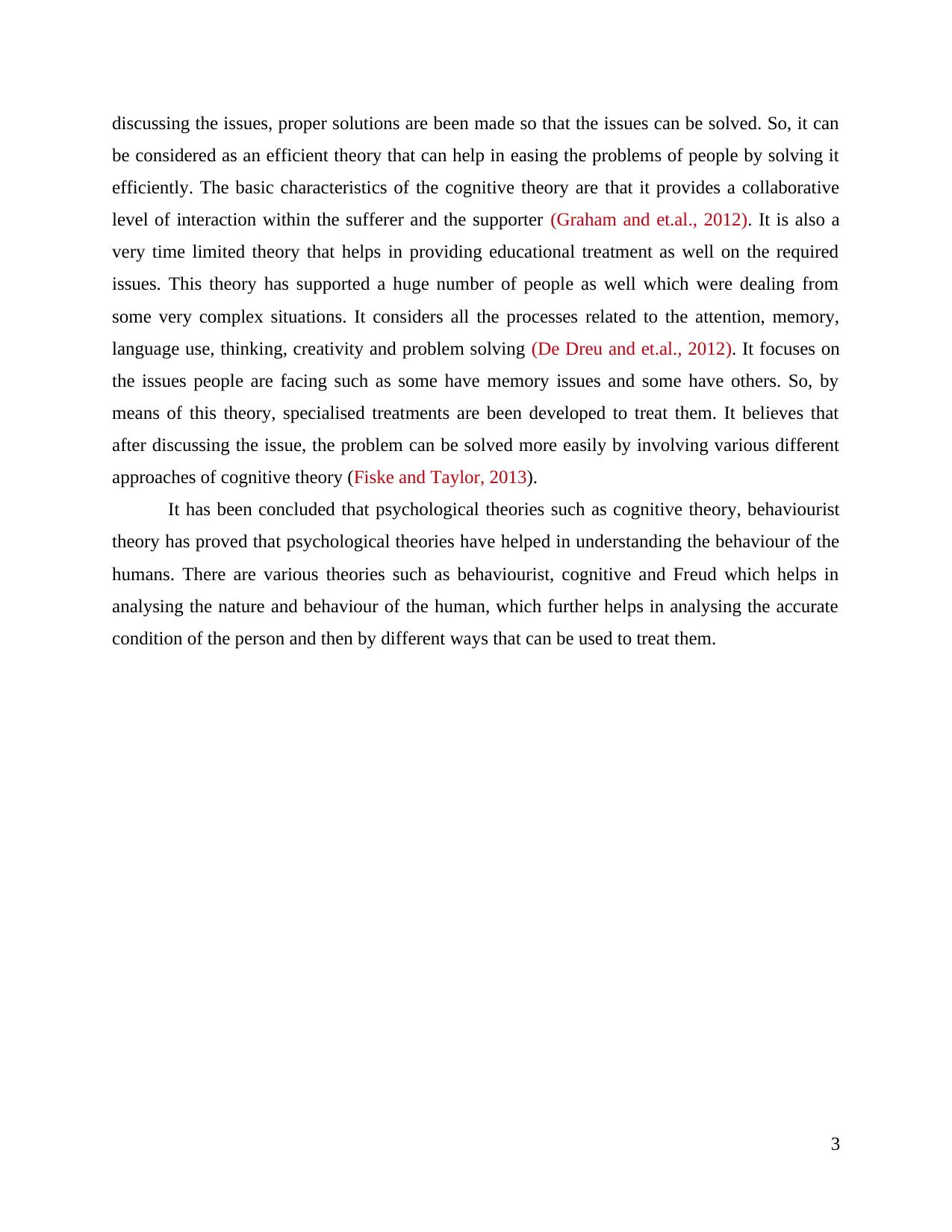
discussing the issues, proper solutions are been made so that the issues can be solved. So, it can
be considered as an efficient theory that can help in easing the problems of people by solving it
efficiently. The basic characteristics of the cognitive theory are that it provides a collaborative
level of interaction within the sufferer and the supporter (Graham and et.al., 2012). It is also a
very time limited theory that helps in providing educational treatment as well on the required
issues. This theory has supported a huge number of people as well which were dealing from
some very complex situations. It considers all the processes related to the attention, memory,
language use, thinking, creativity and problem solving (De Dreu and et.al., 2012). It focuses on
the issues people are facing such as some have memory issues and some have others. So, by
means of this theory, specialised treatments are been developed to treat them. It believes that
after discussing the issue, the problem can be solved more easily by involving various different
approaches of cognitive theory (Fiske and Taylor, 2013).
It has been concluded that psychological theories such as cognitive theory, behaviourist
theory has proved that psychological theories have helped in understanding the behaviour of the
humans. There are various theories such as behaviourist, cognitive and Freud which helps in
analysing the nature and behaviour of the human, which further helps in analysing the accurate
condition of the person and then by different ways that can be used to treat them.
3
be considered as an efficient theory that can help in easing the problems of people by solving it
efficiently. The basic characteristics of the cognitive theory are that it provides a collaborative
level of interaction within the sufferer and the supporter (Graham and et.al., 2012). It is also a
very time limited theory that helps in providing educational treatment as well on the required
issues. This theory has supported a huge number of people as well which were dealing from
some very complex situations. It considers all the processes related to the attention, memory,
language use, thinking, creativity and problem solving (De Dreu and et.al., 2012). It focuses on
the issues people are facing such as some have memory issues and some have others. So, by
means of this theory, specialised treatments are been developed to treat them. It believes that
after discussing the issue, the problem can be solved more easily by involving various different
approaches of cognitive theory (Fiske and Taylor, 2013).
It has been concluded that psychological theories such as cognitive theory, behaviourist
theory has proved that psychological theories have helped in understanding the behaviour of the
humans. There are various theories such as behaviourist, cognitive and Freud which helps in
analysing the nature and behaviour of the human, which further helps in analysing the accurate
condition of the person and then by different ways that can be used to treat them.
3
Paraphrase This Document
Need a fresh take? Get an instant paraphrase of this document with our AI Paraphraser
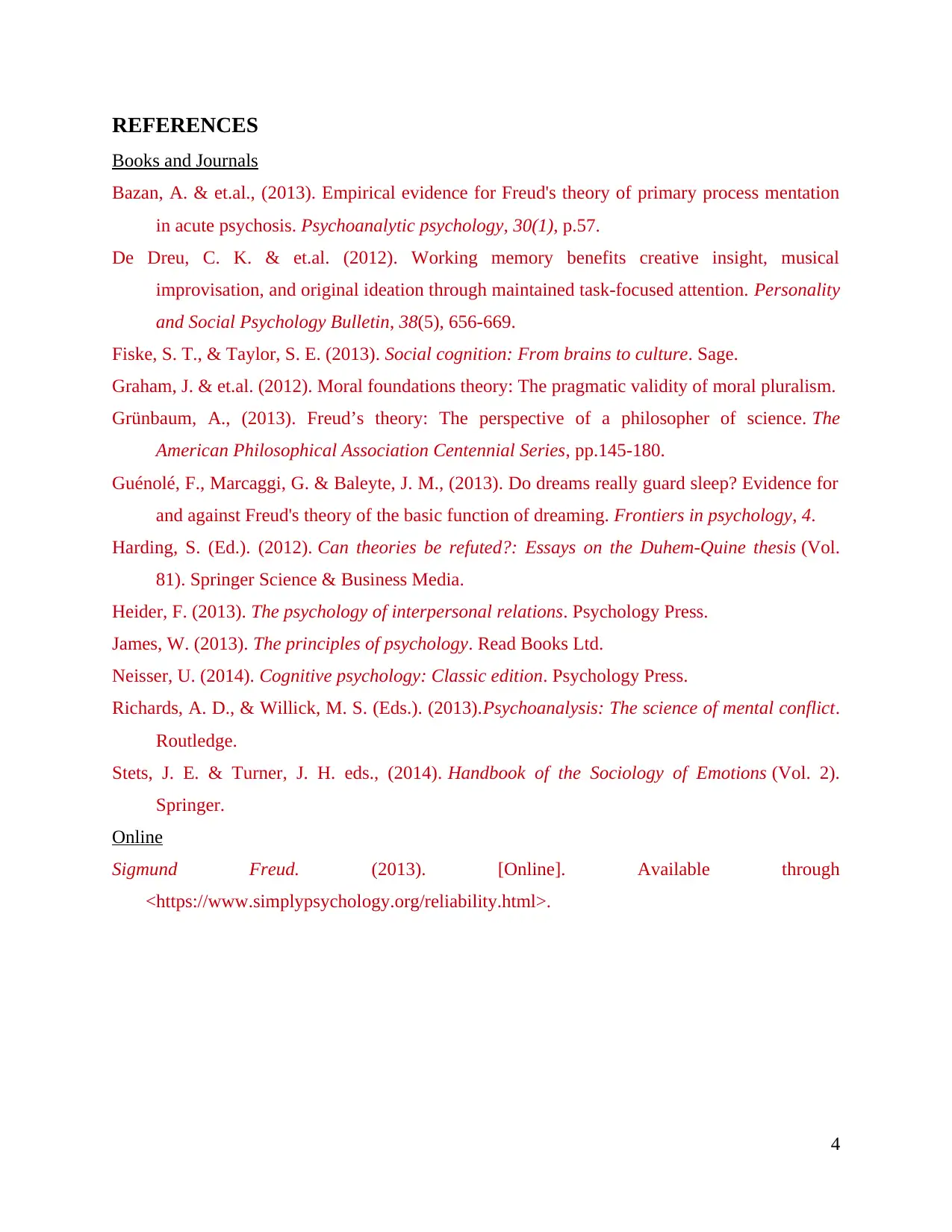
REFERENCES
Books and Journals
Bazan, A. & et.al., (2013). Empirical evidence for Freud's theory of primary process mentation
in acute psychosis. Psychoanalytic psychology, 30(1), p.57.
De Dreu, C. K. & et.al. (2012). Working memory benefits creative insight, musical
improvisation, and original ideation through maintained task-focused attention. Personality
and Social Psychology Bulletin, 38(5), 656-669.
Fiske, S. T., & Taylor, S. E. (2013). Social cognition: From brains to culture. Sage.
Graham, J. & et.al. (2012). Moral foundations theory: The pragmatic validity of moral pluralism.
Grünbaum, A., (2013). Freud’s theory: The perspective of a philosopher of science. The
American Philosophical Association Centennial Series, pp.145-180.
Guénolé, F., Marcaggi, G. & Baleyte, J. M., (2013). Do dreams really guard sleep? Evidence for
and against Freud's theory of the basic function of dreaming. Frontiers in psychology, 4.
Harding, S. (Ed.). (2012). Can theories be refuted?: Essays on the Duhem-Quine thesis (Vol.
81). Springer Science & Business Media.
Heider, F. (2013). The psychology of interpersonal relations. Psychology Press.
James, W. (2013). The principles of psychology. Read Books Ltd.
Neisser, U. (2014). Cognitive psychology: Classic edition. Psychology Press.
Richards, A. D., & Willick, M. S. (Eds.). (2013).Psychoanalysis: The science of mental conflict.
Routledge.
Stets, J. E. & Turner, J. H. eds., (2014). Handbook of the Sociology of Emotions (Vol. 2).
Springer.
Online
Sigmund Freud. (2013). [Online]. Available through
<https://www.simplypsychology.org/reliability.html>.
4
Books and Journals
Bazan, A. & et.al., (2013). Empirical evidence for Freud's theory of primary process mentation
in acute psychosis. Psychoanalytic psychology, 30(1), p.57.
De Dreu, C. K. & et.al. (2012). Working memory benefits creative insight, musical
improvisation, and original ideation through maintained task-focused attention. Personality
and Social Psychology Bulletin, 38(5), 656-669.
Fiske, S. T., & Taylor, S. E. (2013). Social cognition: From brains to culture. Sage.
Graham, J. & et.al. (2012). Moral foundations theory: The pragmatic validity of moral pluralism.
Grünbaum, A., (2013). Freud’s theory: The perspective of a philosopher of science. The
American Philosophical Association Centennial Series, pp.145-180.
Guénolé, F., Marcaggi, G. & Baleyte, J. M., (2013). Do dreams really guard sleep? Evidence for
and against Freud's theory of the basic function of dreaming. Frontiers in psychology, 4.
Harding, S. (Ed.). (2012). Can theories be refuted?: Essays on the Duhem-Quine thesis (Vol.
81). Springer Science & Business Media.
Heider, F. (2013). The psychology of interpersonal relations. Psychology Press.
James, W. (2013). The principles of psychology. Read Books Ltd.
Neisser, U. (2014). Cognitive psychology: Classic edition. Psychology Press.
Richards, A. D., & Willick, M. S. (Eds.). (2013).Psychoanalysis: The science of mental conflict.
Routledge.
Stets, J. E. & Turner, J. H. eds., (2014). Handbook of the Sociology of Emotions (Vol. 2).
Springer.
Online
Sigmund Freud. (2013). [Online]. Available through
<https://www.simplypsychology.org/reliability.html>.
4
1 out of 5
Related Documents
Your All-in-One AI-Powered Toolkit for Academic Success.
+13062052269
info@desklib.com
Available 24*7 on WhatsApp / Email
![[object Object]](/_next/static/media/star-bottom.7253800d.svg)
Unlock your academic potential
Copyright © 2020–2025 A2Z Services. All Rights Reserved. Developed and managed by ZUCOL.





